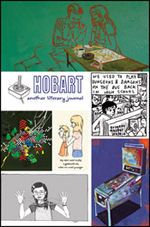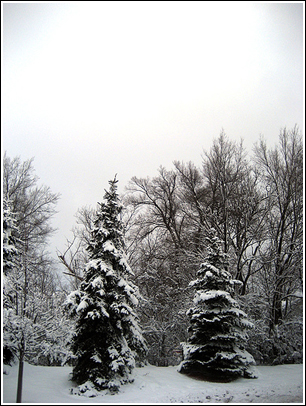|
|||||||||||||
| archives | submissions | blog | (dis)likes | ||||||||||
|
 |
|||
 |
|||
|
Three Stories |
|||
|
On the Oregon Trail |
|||
|
Island Escape |
|||
|
Two Stories |
|||
|
Hannah Tinti |
|||
|
Caitlin Horrocks' first collection of short stories is winner of the Spokane Prize for Short Fiction and will be published in Fall 2009 by University of Eastern Washington Press. She lives in Grand Rapids, Michigan, possibly by way of Independence Rock, the Green River, Soda Springs, Fort Boise, cholera, and snake bite. |
|||

 |
 |
Photo by Ryan Molloy |
Elias was a banker, so we left with more than most. $1,600 to spend at the outfitters—three yoke of oxen, 2000 pounds of food, boxes of bullets and spare parts: tongue, axle, wheel. Two sets of clothes for each of us. "What kind of clothes?" the children asked.
"Who knows?" I said. "The store only sold Clothes. In sets, though. That's something."
They asked what we would eat. "Food," I said. "Just 'Food.' Make your peace with it."
We left Independence in April and saw the first tombstone before we reached the Kansas River. Timmy, Susan, and Edgar ran to read it. Here lies Stinky, it read. He Stinks.
"That's not very nice," I said.
"I bet Stinky does," the children said. "Stink. Now he does, anyway."
The graves were endless: Toot, JoJo, Boogerface. Here Lies a Retard. The children had no sense of solemnity. They read them all howling: Farty McButt farts oxen. Turd is deadHAHAHA. Only one bothered them, fifty miles east of Fort Kearney. TaraRoxx Died of Pooping, they read, and asked, "How do you die of pooping?"
"It's called dysentery," I explained. This terrified the children, that too much poo could be deadly. Dysentery, they whispered to each other, the way they might once have said Werewolf back in Illinois, or Skunk-ape, or the way they said Indians those first nights on the trail. They tapped each other on the shoulders as we tried to sleep and hissed: Dysentery.
The journey would take four months or five, people had told us. Leave too late and we wouldn't make it over the mountains before winter. So we left too early and watched the snows turn to heavy rain. The Big Blue was running high but there was a ferry, $50 to cross. We paid it. Caution was one thing our money could provide.
Timmy went down with the typhoid three weeks in. We tried everything: moved slower, ate better. We rested for days and when he didn't improve raced to Chimney Rock to rest there. We tried to trade, but there was no medicine to buy. There was never any medicine. Outside of Chimney Rock, the trail began to climb, the beginning of the Rocky Mountains. Timmy died outside Fort Laramie and we had to bury him next to someone named ChezyPizza.
Elias started to hunt more after that, like he'd given up on ever reaching Oregon. It had been hare and buffalo on the plains, now squirrel and deer in the forest, bear if he got lucky. He shot wildly for days on end and the carnage was immense: Too much meat to carry back to the wagon. Too much meat that went sour in the heat days later. An embarrassment of flesh. For some reason Elias always left the skins, the fur and leather, the things we could have traded. "We can't take them," he said. "I don't know why. We're just not allowed."
August was boiling, even up in the mountains. The meat clotted in our mouths and I imagined my children turning into bears on this strange diet, sharp teeth and rank breath. They would growl and lumber and stink. But they would not be afraid, I thought. They would no longer whisper dysentery and typhoid in the shadows when the campfire went out. They'd begun to ask if we could just turn around, or build a house where we stood. "We can't," I told them. "Are you familiar with Manifest Destiny?" If the journey had been educational, all they'd learned were the harms that could befall them: the storms, the diseases, the drownings, the wagon wrecks, the broken limbs.
The Green River was running low, drained by the heat. We watched wagon after wagon ford it easily, and were nearly across when one of the oxen slipped. 250 pounds of food, three sets of clothing, a wheel and an axle, eight boxes of bullets and Edgar. We didn't leave a headstone; we'd lost the heart for it. We needed to trade for an axle but days passed until someone asked for something we owned. "Are you sure there's nothing else you want?" we begged them all. "Can we just show you what we have? Can we pay you in cash?"
"Your money's no good," they said. "Just isn't. Only works at general stores and rivers."
At Fort Hall, the new axle broke, and broke again, and we paid someone 150 bullets and three sets of clothing for another. We would have been left traveling naked were there not fewer of us now to clothe. We paid the Indians at the Snake River to guide us across; what was our money worth now? Nothing, if we never made it. Even if we did, some clerk would total our account in Oregon City and say, "Not too impressive, considering what you left with. Did you know there are farmers who do it with $800?"
The trail was an evil joke in the miles to Fort Boise. Susan ate berries she'd found and made herself sick. When we let her ride in the wagon she fell off and broke her ankle. She got the measles next. We rested for days, as if rest could heal her. It was all we could do. We watched wagon after wagon pass us. "You'd best get on," they said. "Winter's coming." We stayed where we were and Susan died anyway.
We traveled as fast as we could then, trying to make up lost ground. One ox died from the pace. Another died in the first blizzard of the year. A third died for lack of forage after the snow fell. In another life, I thought, this might be funny. We crawled to Oregon City with fifteen pounds of food, two sets of clothing and a dying ox. There was a last stretch of river we had to travel, the wagon a caulked rectangle.
We capsized. Elias hit his head on a rock and drowned. The ox made it across along with exactly twelve of our bullets and three pounds of food. I traded them all for clothes enough to cover me. The bystanders who fished me out of the river told me not to feel sorry for myself. "You made it," they said. "You've won."
I thought then of the general store in Fort Laramie, months ago when we had money still, but Elias had wanted to barter. "Why did you kill so much?" the trader asked, wrinkling his nose at the nearly spoilt meat.
"I don't know," Elias said. "I am driven. I am forced. I am spurred to do these things that make no sense."
"I'm sorry about your little ones," the trader said.
"Like flies to wanton boys are we to the gods," Elias said. "They kill us for their sport."
"What the hell does that mean?" the trader asked.
"Don't mind my husband," I said. "He was a banker. He's had more education than's been good for him. Who ever knows what he's on about?"
It was a disloyal thing to say, I feel now. I knew exactly what Elias meant, and I loved that he knew lines of Shakespeare. He had recited me love sonnets once, back in Illinois, when we were young and green. Greener than grass, greener than the treetops in the damp Willamette. The valley spread beneath me when I finally made Oregon. Greener than this, God, I thought. What were we thinking, and why did You make us? What business did a banker have shooting bears?
